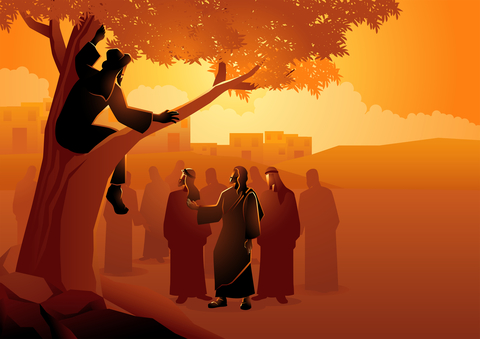
( Dreamstime/Rudall30)
In one of his letters, St. Paul tells the people to whom he's writing that Jesus is the visible image of the invisible God. As we listen to the Scriptures today, I think we'll find out how that works out in a very beautiful way, and also then maybe helps us be more committed to doing what, a few weeks ago in the Letter to the Hebrews that we were reading, the author said: "Keep your eyes fixed on Jesus." We want to know God, don't we? We want to come to have some awareness of God in our lives. Keep your eyes fixed on Jesus. Here's how it works in today's lessons.
Our first lesson from the Book of Wisdom, the author has written very carefully about God and gives us a description of a God who is all powerful, a God who is totally other from ourselves. The author tells us about God, "You are able to show your power at any moment for the entire world. The whole universe before you is like a grain that tips the scales, or like a drop of morning dew on the ground. But because you are almighty, you are merciful to all." What the author is telling us is that God is the God who has the power, which God exercised to bring into being the whole universe.
It's something that is almost beyond our capacity to understand, but that's the power that God has. The entire universe before God is like a grain of sand. The contrast is almost beyond any comprehension. But then the beautiful part is: "Because you are almighty (you are this God of power), you are a God of mercy, you overlook sins. You give your sons and daughters time to repent. You love everything that exists." In fact, it's only God's love that brings anything into existence, including ourselves.
God also is the God of love who is with us at every moment of our existence. That's a very beautiful description of God, but it's still somewhat abstract. It's hard to relate to a God of power. We know we need a God of mercy, but even that is not very personal. It doesn't make God one to whom we can relate very easily except in thanksgiving for that mercy. But in the Gospel we see, don't we, this visible image of the invisible God. Jesus, drawing near the end of his life, walking toward Jerusalem, sees this person who has been a public sinner, known to the whole community.
Advertisement
A tax collector, you may remember, worked for the Roman occupiers of the Holy Land. They collected the taxes and they became very rich doing that; they were paid well. Zacchaeus was such a tax collector. For the most part, people hated him. But somehow he had a spark, a desire within his heart to get to know Jesus. He went to extraordinary means, didn't he? Imagine this very wealthy man, clad in very beautiful clothing, wants to see Jesus but he's stymied because the crowd is too large. They don't like him anyway and so they don't give him a chance. But he sees a tree and he climbs the tree.
I think because Jesus was fully human, you can easily imagine Jesus looking up and smiling. It's kind of a ridiculous thing to see this rich man clad in beautiful garments climbing a tree and sitting on a branch. But Jesus, when he looks up, fulfills what Isaiah had said (If you go back into the Book of Isaiah where the Chosen people had disobeyed God, blatantly. They had gone to war when they were told not to and they were defeated.): "God is waiting to be gracious to them." God is always a God of mercy.
That's what Jesus shows us here. Not only was God, in Jesus, waiting to be merciful, he went towards Zacchaeus, looked up and identified him, reached out to him: "This day I want to eat at your house." People couldn't understand that kind of mercy. Perhaps we struggle to understand it or really believe it. Could God be that merciful to me if I just took that first step? The people of the time began to grumble, "He's a sinner! How can Jesus go to his house and relax and have a good time with that sinner?" Jesus does it because God, in Jesus, is a God of mercy.
We need to try to really draw this into our minds, but most of all, in a sense, into our hearts and understand that we can relate to Jesus in that very same way. We don't have to do some kind of extraordinary thing. We don't have to do terrible penances. We merely need to turn toward Jesus, who is that visible image of the invisible God. Jesus will reach out and fill us with God's love. As long as we turn toward God seeking forgiveness, mercy, and love, it is there.
As I said at the beginning in the Letter to the Hebrews, "Keep your eyes fixed on Jesus." Come to know him as a God of mercy, a God of love. He is the God who is above and beyond all of creation. Jesus Christ is God and shows us a God of mercy, a God of love. Keep your eyes fixed on him to receive that mercy and love and also to change our lives, as Zacchaeus did, to become people who share God's mercy and love with others. Keep your eyes fixed on Jesus.
Editor's note: This homily was given Nov. 3 at St. Ambrose Church, Grosse Pointe Park, Michigan. The transcripts of Bishop Thomas Gumbleton's homilies are posted weekly to NCRonline.org. Sign up here to receive an email alert when the latest homily is posted.








